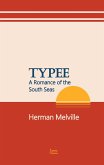Typee (1846) is a work of travel literature by American writer Herman Melville. Its publication was an instant success in both London and New York, earning Melville a reputation as one of America's most promising young authors. Although he claimed to base the entirety of the book on his own experiences as a sailor, it is now believed that the book incorporates aspects of Melville's life with scenes inspired by imagination and other works of travel literature. Despite the success of Typee and subsequent works, Melville's reputation foundered until it was reappraised in the 1920s, when scholars recognized his status as one of nineteenth century America's finest writers. Tired of his life as a sailor, and unwilling to put up with the grueling labor and general cruelty faced by the lowest on board, Melville decides to abandon ship at the island of Nukuheva. Alongside his friend and shipmate Toby, he seizes his opportunity while on shore to escape from the rest of the men in secret. After making their way inland through Nukuheva's densely forested mountains, the pair's only hope for survival depends on the kindness and generosity of the island's native people. After a long and perilous journey, they discover the hidden valley of Typee, whose people welcome the castaways into their midst. Typee is a story of four months spent on a secluded island with a people whose lives seem entirely untouched by Western culture. Its popular success as a work of travel literature enabled Melville to launch a career as a professional writer and established his reputation as a skillful chronicler of adventure. This edition of Herman Melville's Typee is a classic of American literature reimagined for modern readers. Since our inception in 2020, Mint Editions has kept sustainability and innovation at the forefront of our mission. Each and every Mint Edition title gets a fresh, professionally typeset manuscript and a dazzling new cover, all while maintaining the integrity of the original book. With thousands of titles in our collection, we aim to spotlight diverse public domain works to help them find modern audiences. Mint Editions celebrates a breadth of literary works, curated from both canonical and overlooked classics from writers around the globe.
Hinweis: Dieser Artikel kann nur an eine deutsche Lieferadresse ausgeliefert werden.
Hinweis: Dieser Artikel kann nur an eine deutsche Lieferadresse ausgeliefert werden.









